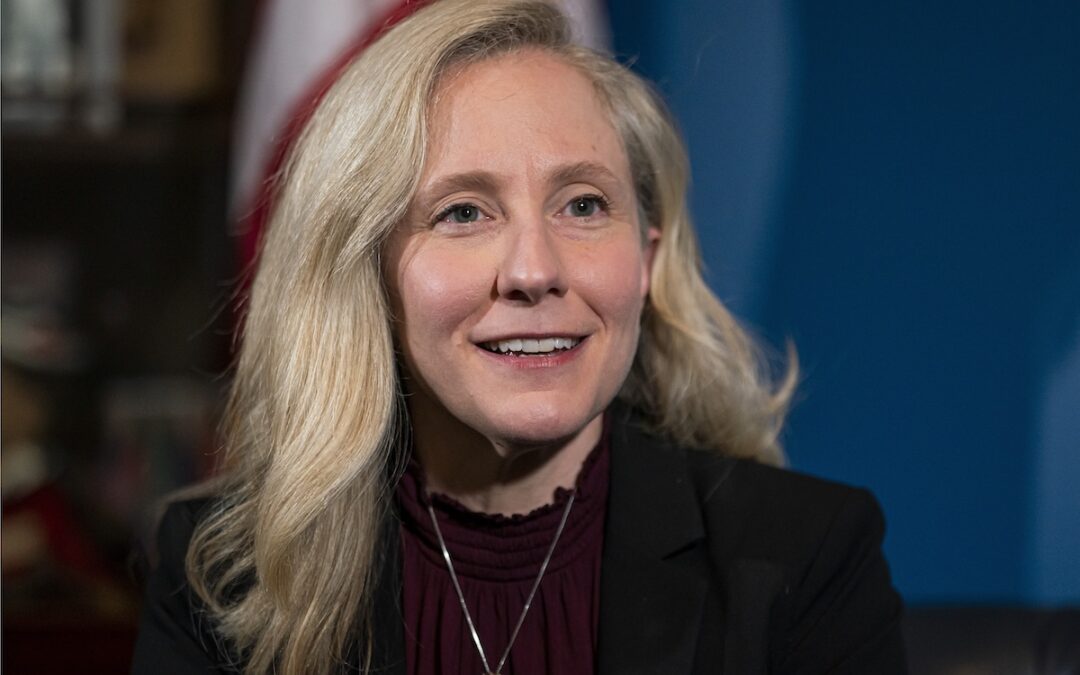
Current Virginia Attorney General Jason Miyares speaking at Liberty University in Lynchburg, Virginia. (The Old Major/Shutterstock)
The role of Attorney General is one many of us may not have fully appreciated until this year. Attorneys General across the country have held the line against assaults on Medicaid, jobs, public education, and—more recently—freedom of speech. Virginia, however, has not had such a fighter for our rights with Republican Jason Miyares.
As we enter the final weeks of the Virginia election, consider what life in the state could look like if—unlike Oregon and Illinois—our state does not have a Democratic Attorney General to defend us from tyrannical military action ordered by President Donald Trump. Imagine what that would mean if we did not have legal protection to exercise our First Amendment rights.
The Attorney General serves as Virginia’s chief legal officer, responsible for defending the Commonwealth, its laws, and its sovereignty from federal overreach and political abuse. While Attorneys General in other states have taken legal action to challenge harmful federal cuts, Miyares has not—leaving Virginians more vulnerable to damaging federal actions. When it comes to defending Virginians’ constitutional rights and the sovereignty of our state, where will Miyares stand?
Over the past several weeks, the federal government has sought to federalize National Guard units and deploy them to Oregon and Illinois, claiming the moves were necessary to address civil unrest and protect federal property. On Sept. 28, 2025, in response to peaceful protests outside an ICE facility in Portland, the Department of Defense—under Secretary Pete Hegseth—ordered troops to be deployed, asserting that the administration had unilateral authority to federalize Guard units without state consent.
Oregon’s Attorney General quickly filed for a temporary restraining order (TRO), arguing that the deployment violated state sovereignty and constituted unlawful federalization. California later joined the complaint to block the use of its National Guard in Oregon. The TRO halted the deployment within hours, setting a legal precedent that limited the administration’s ability to override state control of its Guard forces.
On Oct. 6, following protests over ICE’s aggressive detentions in Chicago, the administration again attempted to federalize Guard troops from Illinois and Texas. As in Oregon, the Illinois Attorney General immediately filed a lawsuit arguing that the action exceeded executive authority and lacked evidence of rebellion or insurrection—the only constitutional grounds for such federalization. A federal judge issued an injunction, temporarily blocking deployment and forcing the administration to justify its actions in court.
Together, these Attorneys General made a decisive difference: their swift legal action checked the President’s overreach, protected their states’ control over their National Guard forces, and reaffirmed the constitutional limits on federal power. Their cases reasserted a crucial principle: that the President cannot seize state military resources for political purposes under the guise of protecting federal property.
While Miyares’ commitment to defending Virginia’s sovereignty remains untested in high-stakes constitutional fights, his record reveals a consistent reluctance to challenge federal policies that harm the interests of Virginians.
In March 2025, Miyares declined to join a multistate coalition that sued to halt termination of $11 billion in healthcare funding despite warnings that Virginia could lose up to $425 million in federal health grants. He also chose not to join other Attorneys General in challenging the Trump administration’s education funding freeze effectively signaling tacit acceptance of those cuts.
When other Attorneys General succeed in these cases, their states can avoid abrupt losses in coverage or funding and gain leverage in negotiations with federal agencies—preserving stability for vulnerable communities.
This pattern of siding with the Republican political agenda at the expense of Virginians is consistent with Miyares’ approach to election law. In 2024, Miyares urged Congress to pass the SAVE Act, which would impose documentary proof-of-citizenship requirements for federal voter registration—a policy that disproportionately burdens women (who change names) and naturalized citizens. In addition, when Republican Gov. Glenn Youngkin ordered a sweeping purge of alleged noncitizens from Virginia’s voter rolls based on faulty DMV data and just weeks before an election, Miyares did not initiate or join defensive legal action, even as the purge drew lawsuits for potential disenfranchisement.
As Attorney General in a second term, we can expect Miyares to do exactly what he has done in the past to check federal overreach, sit on the sidelines, even when the stakes are highest. Across the country, Democratic Attorneys General have fought back against detrimental federal actions—blocking harmful executive orders, defending state funding, and protecting civil rights. By contrast, Miyares’ silence and inaction will leave Virginia vulnerable to federal policies that threaten our people, our communities, and our state’s authority to govern itself.
Virginia needs an Attorney General who will serve to legally defend our state — and its people — from abuse of power. Clearly, Miyares is not up to the job.

Democrat Abigail Spanberger elected Virginia governor
She is the first woman to be elected governor in Virginia’s history. Democrat Abigail Spanberger is projected to win the Virginia governor’s race on...

Spanberger speaks: How she’ll fight Medicaid cuts, create more affordable housing, and protect public schools
From firing tens of thousands of Virginia’s federal workers to cutting $26 billion from the commonwealth’s Medicaid budget to attacking Virginia's...

Who’s running for Virginia attorney general in 2025? What to know about the job
Virginia’s attorney general’s race this year has Democrat Jay Jones facing off against incumbent Republican Jason Miyares. You may be aware that...

Who’s running for Virginia governor in 2025? What to know about the job
The 2025 Virginia governor’s race is between former US Rep. Abigail Spanberger, a Democrat, and current Virginia Lt. Gov. Winsome Earle-Sears, a...

Virginia’s next governor could decide the future of our democracy
Education, jobs, health care, and business—Virginia’s governor will set the direction for a decade. Governors aren’t just state managers—they can...

Spanberger vs. Earle-Sears: How Virginia’s governor hopefuls compare on abortion, climate, and schools
This November, either Abigail Spanberger or Winsome Earle-Sears will be the first female governor in Virginia’s history. Here’s where each woman...





